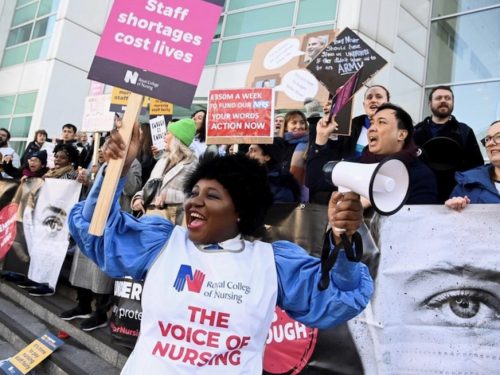Working Nine to Five?
Addressing gendered inequality
and discrimination in UK
workplaces and across
Labour movements
March 7, 2023
Dr Rhona Bridget O’Brien
Stubborn and persistent workplace inequalities are gendered and intersect with age, class, disability, ethnicity and sexual orientation in the UK, in spite of the implementation of the Equal Pay Act (1970) and the Equality Act (2010). The gender pay gap is also experienced at each stage of the life-cycle, with casualised precarity typifying entry into the labour market and significant pension reductions marking women’s departure from it (ONS, 2022).
Female workers constitute 52.7% of the UK workforce, yet earn around 15% less than men. Similarly, female graduates outnumber their male peers, who earn 25% more by the age of thirty. The findings of a recent TUC (Trades Union Congress, 2023) report, suggest the gender pay gap widens after women have children, which equates to working an additional 54 days, for free, annually (TUC, 2023).
Gender and ethnicity pay gaps are experienced disproportionately by women of colour and migrant women. However, all working-class women are more likely to be undervalued, underrepresented and discriminated against, at work and at home.
Female UK workers are more likely to be:
- Undervalued as key workers across all sectors
- Overrepresented in caring roles (nursing, allied health professions and social care)
- Overrepresented in the education sector where over 70% of workers are female
- Overrepresented across public sector administration roles where the largest pay freeze/ cuts/ wage stagnation are experienced
- Underrepresented in terms of bonus pay. The gendered bonus pay gap is 41%
- Employed on part-time, casualised and insecure contracts
- In receipt of employment benefits due to wage stagnation and/ or due to a disability
- Experiencing discrimination in the workplace
- Exposed to discrimination at home, with conservative estimates suggesting 1 in 4 women in England and Wales at risk of Domestic Abuse
- Engaged in unpaid caring responsibilities and domestic labour
- Experiencing pension inequalities (Women’s Budget Group, 2020)
Understandably, women in the UK context are politicising their lived experiences again. They are mobilising in number, are voting with their feet and are visible on picket lines across the UK. Women have voted overwhelmingly for strike action, often within Trade Unions led by female General Secretaries (Royal College of Nursing, National Education Union, University and College Union, Unite the Union) and across sectors in which they are overrepresented yet underpaid. Evidence produced by the TUC suggests that workplaces with strong branch membership and activism are securing above inflation pay increases for those willing to strike (TUC, 2022).
With little or no experience of workplace organising, many women new to Labour movements are now engaging in activism prior to, during and after successful ballots. In addition to nine-five day jobs and unpaid domestic labour, women are engaging in out-of-hours activism – planning, leafleting and organising for pickets, rallies and demonstrations.
However, at this pivotal, historic and promising moment, new government legislation attempts to disable our right to strike (Anti-Strike Bill, 2023). The need to ensure the oppressive conditions impacting women’s working lives are not replicated within narcissistic, authoritarian activist spaces has never been greater. Patriarchal cultures within Labour movements have celebrated and rewarded expressions of toxic masculinity, which many women are forced to navigate on a daily basis.
To ensure we retain the support of new or returning female, male and non-binary comrades, it is vital our activist spaces are welcoming, member-led, inclusive and accountable. Working-class women must be encouraged into key activist roles, within democratic activist cultures and supported onto platforms where their lived experiences are valued and their powerful voices amplified.
References:
Neate, R & Topping, A (2023) ‘Women work two months for free, reveals TUC analysis’, The Guardian [online] 23rd February. Available from:
https://www.theguardian.com/business/2023/feb/23/women-work-two-months-for-free-reveals-tuc-analysis
Elgot, J (2023) Anti-strike Bill Discriminates Against Women, Say Campaigners’ The Guardian [online] 21st February. Available from:
Office for National Statistics (2022) ‘Gender Pay Gap in the UK’ [online] October. Available from: https://www.ons.gov.uk/employmentandlabourmarket/peopleinwork/earningsandworkinghours/bulletins/genderpaygapintheuk/2022
Refuge (2023) The Facts [online]. Available from:
https://refuge.org.uk/what-is-domestic-abuse/the-facts/embed/#?secret=UwTO1lRds8#?secret=RvhBpFs8zf
Trades Union Congress (2023) ‘Gender Pay Gap Means Women Work for Free for Two Months of the Year’ [online] February 23rd. Available from:
https://www.tuc.org.uk/news/gender-pay-gap-means-women-work-free-two-months-year-tuc
Women’s Budget Group (2020) ‘Pensions and Gender Inequality: a pre-budget briefing from the Women’s Budget Group’ [online] March. Available from:
https://wbg.org.uk/wp-content/uploads/2020/02/final-pensions-2020.pdf
Women’s Budget Group (2022) ‘The Income Crisis: A Gendered Analysis’ [online] June. Available from:





